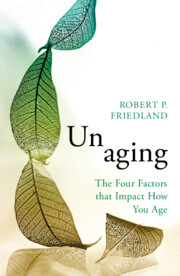Book contents
- Unaging
- Reviews
- Unaging
- Copyright page
- Dedication
- Contents
- List of Figures and Tables
- Preface
- Part I Foundations: What Do We Need to Know about Optimal Aging?
- Part II Applications: What Can We Do about the Opportunity of Aging?
- 12 Overview
- 13 Physical Activity
- 14 Whole Body Health
- 15 Mental Activity
- 16 Psychological Measures
- 17 Social Factors
- 18 Dealing with Stress
- 19 Sleep
- 20 Diet
- 21 Microbial Considerations
- 22 Dental Care
- 23 Dealing with Doctors and Drugs
- 24 Hazardous Behaviors
- 25 Toxic Exposures
- Part III Conclusions
- Acknowledgments
- Glossary
- References
- Index
17 - Social Factors
from Part II - Applications: What Can We Do about the Opportunity of Aging?
Published online by Cambridge University Press: 15 September 2022
- Unaging
- Reviews
- Unaging
- Copyright page
- Dedication
- Contents
- List of Figures and Tables
- Preface
- Part I Foundations: What Do We Need to Know about Optimal Aging?
- Part II Applications: What Can We Do about the Opportunity of Aging?
- 12 Overview
- 13 Physical Activity
- 14 Whole Body Health
- 15 Mental Activity
- 16 Psychological Measures
- 17 Social Factors
- 18 Dealing with Stress
- 19 Sleep
- 20 Diet
- 21 Microbial Considerations
- 22 Dental Care
- 23 Dealing with Doctors and Drugs
- 24 Hazardous Behaviors
- 25 Toxic Exposures
- Part III Conclusions
- Acknowledgments
- Glossary
- References
- Index
Summary
Humans are social beings and relationships with family and friends are critical for health at all stages of life. Studies have shown a higher risk of dementia in later life in individuals with poor social interactions. At all stages of life, it’s desirable for people to have healthy relationships with others. Maintaining a socially active lifestyle in later life enhances cognitive reserve and benefits cognitive function. The physical component of social interactions is also of value. Interpersonal experiences can influence the structure and function of the brain in both early and later life. Opportunities for interactions with other people enhances social reserve and improves cognitive, physical, and psychological reserves. Studies suggests that dementia is more common in those whose social engagement declines from mid- to late-life. Having stronger social contacts protects people from the manifestations of aging and age-related brain disease. Social interactions can be enhanced in aging through community organizations, social action groups, religious activities, and travel. Pursuing activities that help you find meaning will also help you make social connections.
- Type
- Chapter
- Information
- UnagingThe Four Factors that Impact How You Age, pp. 216 - 218Publisher: Cambridge University PressPrint publication year: 2022

